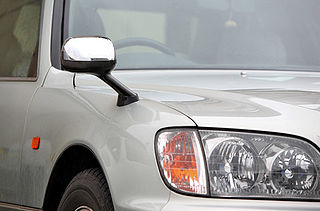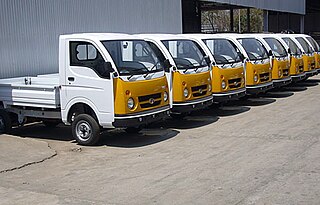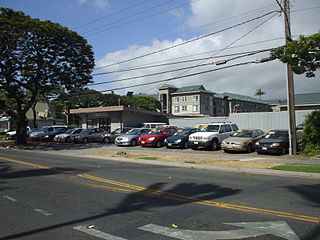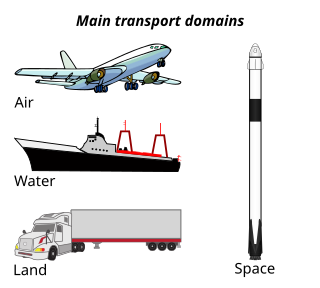
A bus is a motor vehicle that carries significantly more passengers than an average car or van, but less than the average rail transport. It is most commonly used in public transport, but is also in use for charter purposes, or through private ownership. Although the average bus carries between 30 and 100 passengers, some buses have a capacity of up to 300 passengers. The most common type is the single-deck rigid bus, with double-decker and articulated buses carrying larger loads, and midibuses and minibuses carrying smaller loads. Coaches are used for longer-distance services. Many types of buses, such as city transit buses and inter-city coaches, charge a fare. Other types, such as elementary or secondary school buses or shuttle buses within a post-secondary education campus, are free. In many jurisdictions, bus drivers require a special large vehicle licence above and beyond a regular driving license.

A pickup truck or pickup is a light or medium duty truck that has an enclosed cabin, and a back end made up of a cargo bed that is enclosed by three low walls with no roof. In Australia and New Zealand, both pickups and coupé utilities are called utes, short for utility vehicle. In South Africa, people of all language groups use the term bakkie; a diminutive of Afrikaans: bak, meaning bowl or container.
Ian Gordon Murray, is a South African-British designer of Formula One racing cars for Brabham and McLaren and the McLaren F1 high-performance road car. Founder and CEO of Gordon Murray Design and Gordon Murray Automotive, he has subsequently designed and built a number of sports cars and a variety of other automotive vehicles.

The car-free movement is a social movement centering the belief that large and/or high-speed motorized vehicles are too dominant in modern life, particularly in urban areas such as cities and suburbs. It is a broad, informal, emergent network of individuals and organizations, including social activists, urban planners, transportation engineers, environmentalists and others. The goal of the movement is to establish places where motorized vehicle use is greatly reduced or eliminated, by converting road and parking space to other public uses and rebuilding compact urban environments where most destinations are within easy reach by other means, including walking, cycling, public transport, personal transporters, and mobility as a service.

Tata Motors Limited is an Indian multinational automotive company, headquartered in Mumbai and part of the Tata Group. The company produces cars, trucks, vans, and buses.

The term "Japanese domestic market" ("JDM") refers to Japan's home market for vehicles and vehicle parts. Japanese owners contend with a strict motor vehicle inspection and grey markets. JDM is also used as a term colloquially to refer to cars produced in Japan but sold in other countries. JDM does not necessarily refer to the market that the vehicle is destined for.

An autorack, also known as an auto carrier, is a specialized piece of railroad rolling stock used to transport automobiles and light trucks. Autoracks are used to transport new vehicles from factories to automotive distributors, and to transport passengers' vehicles in car shuttles and motorail services, such as Amtrak's Auto Train route.
Output-based aid (OBA) refers to development aid strategies that link the delivery of public services in developing countries to targeted performance-related subsidies. OBA subsidies are offered in transport construction, education, water and sanitation systems, and healthcare among other sectors where positive externalities exceed cost recovery exclusively from private markets. OBA is a form of results-based financing, with similar principles as performance-based contracting.

An electric truck is a battery electric vehicle (BEV) designed to transport cargo, carry specialized payloads, or perform other utilitarian work.
Bedford Vehicles, usually shortened to just Bedford, was a brand of vehicle manufactured by Vauxhall Motors, then a subsidiary of multinational corporation General Motors. Established in April 1931, Bedford Vehicles was set up to build commercial vehicles. The company was a leading international lorry brand, with substantial export sales of light, medium, and heavy lorries throughout the world.

The Tata Ace is a model of mini truck manufactured by Tata Motors which was launched in 2005.

A used car, a pre-owned vehicle, or a secondhand car, is a vehicle that has previously had one or more retail owners. Used cars are sold through a variety of outlets, including franchise and independent car dealers, rental car companies, buy here pay here dealerships, leasing offices, auctions, and private party sales. Some car retailers offer "no-haggle prices," "certified" used cars, and extended service plans or warranties.
Sir Torquil Patrick Alexander Norman, is a British businessman, aircraft enthusiast, and arts philanthropist.
Stevens Vehicles Ltd is a British electric car and van manufacturer based in Port Talbot. The company is a manufacturer of zero emission electric cars and vans designed by the father and son team of Tony Stevens and Peter Stevens. The vehicles were conceived, designed and developed in Kent, England and are manufactured at Port Talbot, Wales.

Transport or transportation is the intentional movement of humans, animals, and goods from one location to another. Modes of transport include air, land, water, cable, pipelines, and space. The field can be divided into infrastructure, vehicles, and operations. Transport enables human trade, which is essential for the development of civilizations.
A basic utility vehicle (BUV) is a simple rugged vehicle designed for use in the developing world. A slew of such vehicles were developed in the late 1960s and early 1970s; most only reached limited production and market penetration, as used Western vehicles often proved cheaper. In Southeast Asia, these are often referred to as Asian utility vehicles (AUV). They have also been called basic transportation vehicles (BTV).

Euro Truck Simulator 2 is a truck simulator game developed and published by SCS Software for Microsoft Windows, Linux, and macOS and was initially released as open development on 18 October 2012. The game is a direct sequel to the 2008 game Euro Truck Simulator and it is the fourth video game in the Truck Simulator series.

The automotive industry in Croatia employs about 10,000 people in over 130 companies. AD Klaster, members of the Croatian Association of Automotive Parts Manufacturers at the Industry sector of the Croatian chamber of economy employs about 6000 employees and generates profit of about US$600 million. There are also other companies which are not a part of AD Klaster, like AVL, Cetitec, Saint Jean Industries, König metal, Lipik Glas, Nexus, Yazaki, LTH, Multinorm, Institut RT-RK, Galo industries, and others.
Roughly 720,000 cars per year are being sold in Nigeria every year. Only c. 140.000 of them have been built domestically.

Affordable housing is housing that is deemed affordable to those with a median household income as rated by the national government or a local government by a recognized housing affordability index. A general rule is no more than 30% of gross monthly income should be spent on housing, to be considered affordable as the challenges of promoting affordable housing varies by location.












